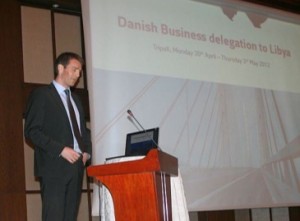By Ibrahim A El Mayet.
Tripoli, 2 May
The delegation organised by the Confederation of Danish Industry comprising 26 Danish companies that arrived . . .[restrict]in Tripoli on Monday was given a full briefing on the Libyan economy yesterday by Libya’s Minister of Planning Isa Tuwejri. The briefing was part of the delegation’s “kick-off” session. It was opened by by the Danish Chargé d’Affaires Anders Tang Friborg.

After years of diplomatic isolation the visit by the Danish delegation is being seen as something of a landmark event demonstrating the growing strength of the newly re-forged relationship between the two countries. Relations between Gaddafi’s Libya and Denmark were sour and diplomatic ties were severed in the mid-1980’s when the Danish government closed their embassy in Tripoli.
The opening of a new Danish embassy in Tripoli in February this year marked the resumption of a very old relationship. A Danish Consulate first opened in Tripoli 260 years ago in an effort to combat piracy in the Mediterranean.
Opening the session Friborg spoke of Denmark’s pride in the support they gave to Libya through the NATO coalition. Highlighting some similarities between Libya and Denmark in terms of population size and the desire to establish an effective welfare model for their citizens, he confirmed Denmark’s commitment to establishing strong commercial ties with Libya and answering Libya’s requests for skills and technology transfer. With a thriving private sector made up largely of small and medium enterprises with a wide range of expertise, Danish companies had a lot to offer, he said.
Beyond business the Danish are keen to develop a closer relationship with Libya. Following their early recognition of the NTC in 2011 the Danish Foreign Minister and current Prime Minister, Helle Thorning-Schmidt (who was leader of the opposition at time), visited Benghazi in June 2011. Friborg believes the Danish can play a role many areas including helping Libya develop its media and creating effective institutions for the rule of law. The Danish development fund will be used to assist Libya as a key pillar of Denmark’s engagement.
Addressing the delegation Libya’s Minister of Planning Isa Tuwejri recognised Denmark’s contribution through NATO and praised the Danish for their support of the NTC. Indicating the many challenges that Libya faces the Minister stressed the importance of economic diversification and encouraging the growth of Libya’s private sector in order to tackle the high rates of unemployment and move away from a reliance on oil revenues.
Tuwejri highlighted the fact that Libya’s current difficulties were a legacy of the Qaddafi regime which in the late 1970s abandoned Libya’s existing development plans in favour of his own personal brand of socialism which banned private enterprise and resulted in state corruption and cronyism. The previous lack of coherent planning left Libya facing many challenges, he said, including issues with energy production and distribution. International companies had an important role to play in providing technology, processes, expertise and training. But what Libya needed, he emphasised, was long term partners committed to doing business in Libya with Libyans. [/restrict]






